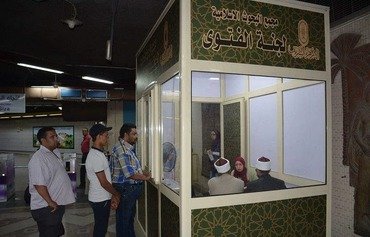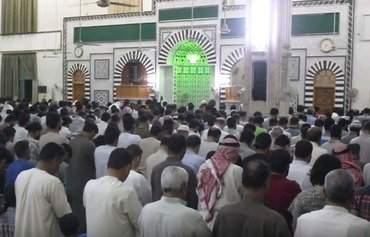The Council of Senior Scholars, Saudi Arabia's highest religious body, has renewed efforts to draw attention to fatwas it has issued that denounce terrorism in all its aspects.
These fatwas are critically important, observers say, since groups such as al-Qaeda and the "Islamic State of Iraq and the Levant" (ISIL) have been using religion as a recruitment tool, disseminating false fatwas aimed at drawing in young people.
The kingdom's highest religious authorities have issued many fatwas denouncing terrorism, but they have not been sufficiently publicised, said Al-Imam Muhammad ibn Saud University sociology of religion professor Mahmoud Salem.
It is therefore necessary to restate them periodically, he told Al-Mashareq, and to re-circulate them to ensure they reach the largest population possible.
The continuing circulation of fatwas that denounce terrorism also will contribute to correcting misperceptions about Islam and its adherents, he said.
Previous fatwas issued by the authorities encompass everything from membership in a terrorist organisation to financing and providing assistance to such groups, he said.
"One such fatwa states that those who 'participate in, cover up, instigate, finance or provide any form of assistance to the perpetration of a terrorist act deserve a prohibitive and deterrent punishment, the type and extent of which is determined by the courts depending on the crime committed'," he said.
It is clear that this ruling prohibits any involvement, sympathy or financing of terrorists, and this is of utmost importance, he said, as some parties have sought to exploit charitable donations and zakat to finance terrorist groups.
Another fatwa states that "financing or embarking on terrorism, either by providing or collecting funds or participating in [an act of terrorism] in any way is a crime punishable by law", he said.
Other fatwas reveal the determination of senior scholars to plug any loophole that might be exploited, Salem said.
Fighting terrorism 'a religious duty'
The Council of Senior Scholars states that terrorism is "a heinous crime, an injustice and aggression that is rejected by sharia and human nature", Salem said.
"It is forbidden by sharia, and confronting and fighting it is a religious duty," he added.
Terrorists seek only to sow sedition, murder innocents and harm public and private property, according to the council, which stresses that fighting terrorism is a duty, under sharia, to protect the kingdom and its citizens from discord.
Adel al-Usaimi, imam of al-Khair mosque in Riyadh, told Al-Mashareq he tries the best he can, through his position and work, to reiterate the council's fatwas on terrorism and explain them clearly and correctly.
In his dealings with young people in particular, he said, he "provides constant reminders of the need to verify the source of a fatwa and inclinations of the cleric who issues it".
Al-Usaimi said he advises youth to stay away from questionable websites, which extremist groups use to try to them draw in, and tries to provide additional guidance to youth he encounters who show signs of being brainwashed.
Erroneous fatwas
The issuance of fatwas has been restricted to the Council of Senior Scholars to prevent the issuance of excessive and erroneous fatwas, al-Usaimi said.
"The fatwas issued by senior scholars in the kingdom are of great importance in terms of countering deviant and terrorist ideas, for the Saudi people are known for their adherence to religion and especially fatwas issued by religious authorities," said Fadel al-Hindi, a supervisor at the King Abdulaziz University Centre for Social and Humanities Research.
It is critical to promote anti-terrorist fatwas in light of the vast numbers of misleading fatwas being propagated by groups such as al-Qaeda and ISIL in their attempts to lure in young Saudis, he told Al-Mashareq.
"These groups exploit religion and technological advances in such a way that makes the false fatwas they issue seem real to some who do not care to research the origin and source of the fatwa," he said.
To put it simply, he added, a Saudi youth who is not well acquainted with the fundamentals of sharia could be vulnerable to having his mind poisoned with the fatwas promoted by extremist media.
For example, he said, some young men have been persuaded to head to Syria or Iraq to perform "jihad" as a result of these fraudulent rulings, "while jihad has requirements and concepts that are different from those being promoted".
Many such youth were arrested upon their return and have since backed away from their extremist views after becoming more informed through counseling programmes that seek to expose the lies of these groups, al-Hindi noted.

![The Saudi Ministry of Islamic Affairs, Da'wah and Guidance conducts a training session to spread religious knowledge. [Photo courtesy of Saudi Press Agency]](/cnmi_am/images/2016/08/29/6074-Saudi-religious-guidance-600_384.jpg)






By God, the ones who created terrorism are the damned Mohammed bin Abdul Wahhab, the founder of the diabolic, Wahhabi movement; the enemy, Al Saud; and the damned mufti of the kingdom of devils. You’re the grandchildren of apes and pigs.
Reply1 Comment(s)